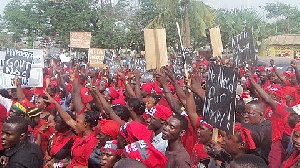Residents in eight communities in the Upper Manya Krobo District in the Eastern Region demonstrated on Friday February 12 in demand for good roads, clean water and development.
They have threatened to boycott the November polls if their demands are not met.
Scores of demonstrators marched through Sekesua, Ponponya and Fantem streets holding aloft placards that said: “We want lights in our communities”, “no potable drinking water in Upper Manya, no vote”, “no good road in Sekesua, no vote”, and “no SHS, no vote.”
The people of Krobo are not the only ones threatening to boycott the polls if they do not see development in their area.
In late January this year, residents of Miaso, a community in the Kwahu East District, also in the Eastern region, demanded they be connected to the national grid or will not vote.
They said different governments have lied to them for the past 20 years, as far as connecting them to the grid is concerned, and, so, they have resolved not to entertain any more lies from politicians.
The chief of the area, Nana Owusu Aduomi II, lamented that the lack of electricity was causing the youth to leave the place in droves to seek greener pastures in the cities.
Similarly, commercial drivers, who ply the Abura Dunkwa-Mankessim road in the Central region, recently warned government that it risked losing their votes in this year’s polls if the rehabilitation of the route is not completed.
They said the poor road was draining them financially, while endangering the lives of road users.
Accra News’ Central regional correspondent, Ebenezer Ackom, reported that some of the drivers at Abura Dunkwa in the Abura Asebu Kwamankese District said it had become a daily chore to visit the nearby town of Nyankumase-Ahenkro to fix their cars after returning from a single trip to Mankessim.
They complained that prices of spare parts had shot up, forcing them to use all the sales of a day’s work to service their vehicles.
They also revealed that they often were at the receiving end of abuse from passengers due to the bumpy terrain they constantly had to navigate.
Regional News of Friday, 12 February 2016
Source: classfmonline.com













